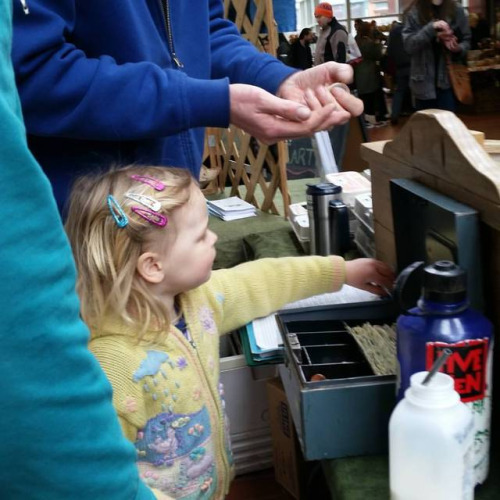via http://ift.tt/2oi8PJa:klyaksa1 replied to your post “deputychairman answered your question “Tonight’s question, over…”
You mentioned that your MIL is Latvian and her condiment sets include a mustard pot. I don’t know when she (or her ancestors) came to the US, but the mustard you are probably talking about is the kind sold in Russian stores. Thick (it is sold in little jars and you spoon it out, no squeeze bottles) and very, very hot. American mustard is much sweeter and almost tasteless by comparison.
Her family fled as refugees from the Soviets during WWII, and so arrived in the US circa 1945. She was born here, but her oldest sister remembers Latvia, and her brother was born in a displaced person’s camp in Germany.
Needless to say, she is personally horrified by current politics.
We actually do have access to an astonishing array of mustards, out in Buffalo, but I have yet to attempt Russian ones. I’ll have to consult with dude’s aunt; she’s hosting Easter this year.
A couple of years back, we went to Easter at her house and none of the cousins were in attendance, and neither was Dude’s mom so it was just the four of us, me and dude and Aunt and her recently-now-deceased husband, and Uncle Vitalis got a little tipsy and reminisced about Old Country. He was a few years older even than her, and remembered the war; her English is extremely precise and notable for its lack of accent, but he spoke with a faint indistinct accent his whole life, worsened later by teeth problems.
He particularly remembered a fighter plane coming over and circling the farm, German I think, and he took cover under a pile of wood, and thought he’d been shot and was screaming, but when his father came and got him out it was just that a piece of the wood had nails in it and he’d poked himself.
He also reminded us that under the old ways, Lent was a real thorough fast, and you ate no eggs or milk or meat for the duration, and so by God, on Easter morning there had better be a feast– but it was always a great feast composed of entirely cold foods, because the women had to spend all morning at church too, you know!
But, he mused, there never really would have been much to eat during Lent anyway– the hens were usually in their molt, and laying few eggs, and you might be planting but there wasn’t much coming up yet, and your stores of meat were dwindling but the new livestock weren’t really ready to slaughter yet, the cows were dry because they were due to calf soon, so it was just as well to have an excuse to save everything up for a big feast, as something to look forward to, as it was lean times anyway.

You mentioned that your MIL is Latvian and her condiment sets include a mustard pot. I don’t know when she (or her ancestors) came to the US, but the mustard you are probably talking about is the kind sold in Russian stores. Thick (it is sold in little jars and you spoon it out, no squeeze bottles) and very, very hot. American mustard is much sweeter and almost tasteless by comparison.
Her family fled as refugees from the Soviets during WWII, and so arrived in the US circa 1945. She was born here, but her oldest sister remembers Latvia, and her brother was born in a displaced person’s camp in Germany.
Needless to say, she is personally horrified by current politics.
We actually do have access to an astonishing array of mustards, out in Buffalo, but I have yet to attempt Russian ones. I’ll have to consult with dude’s aunt; she’s hosting Easter this year.
A couple of years back, we went to Easter at her house and none of the cousins were in attendance, and neither was Dude’s mom so it was just the four of us, me and dude and Aunt and her recently-now-deceased husband, and Uncle Vitalis got a little tipsy and reminisced about Old Country. He was a few years older even than her, and remembered the war; her English is extremely precise and notable for its lack of accent, but he spoke with a faint indistinct accent his whole life, worsened later by teeth problems.
He particularly remembered a fighter plane coming over and circling the farm, German I think, and he took cover under a pile of wood, and thought he’d been shot and was screaming, but when his father came and got him out it was just that a piece of the wood had nails in it and he’d poked himself.
He also reminded us that under the old ways, Lent was a real thorough fast, and you ate no eggs or milk or meat for the duration, and so by God, on Easter morning there had better be a feast– but it was always a great feast composed of entirely cold foods, because the women had to spend all morning at church too, you know!
But, he mused, there never really would have been much to eat during Lent anyway– the hens were usually in their molt, and laying few eggs, and you might be planting but there wasn’t much coming up yet, and your stores of meat were dwindling but the new livestock weren’t really ready to slaughter yet, the cows were dry because they were due to calf soon, so it was just as well to have an excuse to save everything up for a big feast, as something to look forward to, as it was lean times anyway.






